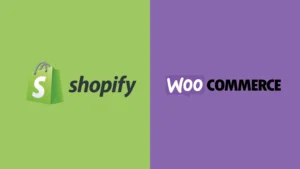Shopify vs woocommerce
When launching an eCommerce store, one of the most critical decisions you’ll make is choosing the right platform. Two of the most popular options available today are Shopify and WooCommerce. Both offer robust features and are capable of powering small businesses to large-scale enterprises. However, they differ in structure, flexibility, cost, and usability.
In this article, we compare Shopify and WooCommerce across key areas to help you decide which is best for your business.

1. Overview
Shopify
Shopify is a hosted eCommerce platform, meaning everything from hosting to security is handled for you. It’s known for its user-friendly interface and fast setup, making it ideal for beginners.
WooCommerce
WooCommerce is an open-source WordPress plugin that turns your website into a fully functioning online store. It offers maximum customization but requires more technical know-how and hosting management.
2. Ease of Use
- Shopify: Extremely easy to use. With drag-and-drop tools, built-in hosting, and an intuitive dashboard, even non-technical users can launch a store in a few hours.
- WooCommerce: Offers greater control, but with a steeper learning curve. You’ll need to set up WordPress, choose a theme, and manage plugins and hosting.
Winner : Shopify (for beginners)
3. Design and Themes
- Shopify: Offers 100+ professional themes (both free and paid). All themes are mobile responsive and optimized for conversions.
- WooCommerce: Offers unlimited design flexibility through WordPress themes, including thousands of free and premium options. Ideal for custom designs.
Winner: WooCommerce (for design freedom)
4. Features and Flexibility
- Shopify: Offers essential eCommerce features out-of-the-box including inventory management, multichannel selling (Facebook, Instagram, Amazon), and built-in payment gateways.
- WooCommerce: Highly flexible with thousands of plugins and extensions. You can customize anything, from checkout flow to user experience.
Winner: WooCommerce (for advanced customizations)
5. Payment Options and Fees
- Shopify: Supports 100+ payment gateways. If you use Shopify Payments, there are no transaction fees; otherwise, you may pay extra fees (up to 2%).
- WooCommerce: Supports all major gateways including PayPal, Stripe, Razorpay, and more. No platform fees—only the standard gateway fees apply.
Winner: WooCommerce (more freedom, no extra platform fees)
6. Pricing
- Shopify:
- Basic: $39/month
- Shopify: $105/month
- Advanced: $399/month
(Hosting, SSL, and security included)
- Basic: $39/month
- WooCommerce:
- Plugin is free, but costs add up:
- Hosting: $5–$25/month
- Domain: $10–$15/year
- Themes & Plugins: Variable
- Hosting: $5–$25/month
- Plugin is free, but costs add up:
Winner: WooCommerce (more control over cost, but can add up)
7. Security
- Shopify: Comes with built-in SSL, PCI compliance, and automatic backups.
- WooCommerce: Security depends on your hosting and plugins. You’re responsible for backups and updates unless you use managed WordPress hosting.
Winner: Shopify (less hassle)
8. SEO Capabilities
- Shopify: Good SEO features, fast-loading pages, and mobile-optimized themes.
- WooCommerce: Exceptional SEO flexibility thanks to WordPress. You can install powerful SEO plugins like Yoast or Rank Math.
Winner: WooCommerce (for SEO control)
9. Support
- Shopify: 24/7 customer support via live chat, email, and phone. Large knowledge base and community forums.
- WooCommerce: Community-driven support. Official documentation is available, but real-time help depends on hosting providers or third-party developers.
Winner: Shopify (for direct support)
Final Verdict: Shopify vs WooCommerce
Feature | Winner |
Ease of Use | Shopify |
Design Flexibility | WooCommerce |
Features & Plugins | WooCommerce |
Payment Flexibility | WooCommerce |
Cost Control | WooCommerce |
Security | Shopify |
SEO | WooCommerce |
Customer Support | Shopify |
Choose Shopify if:
- You want an easy, all-in-one solution with hosting and support included.
- You prefer minimal setup and maintenance.
Choose WooCommerce if:
- You want complete customization and control.
- You’re comfortable managing hosting and WordPress.
Final Thoughts
Both platforms are powerful in their own right. The choice between Shopify and WooCommerce depends on your budget, technical skills, and long-term goals. Shopify is perfect for those who want simplicity and speed, while WooCommerce is ideal for those who value flexibility and customization.

